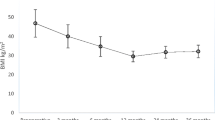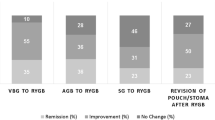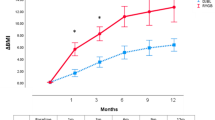Abstract
Introduction
Roux-en-Y gastric bypass (RYGB) has been shown to significantly improve glucose control in patients with type 2 diabetes (T2DM). The formation of a gastrogastric fistula (GGF) allows nutrients to pass through the native route, rather than bypassing the duodenum in typical RYGB configuration. We sought to evaluate the effect of revisional bariatric surgery for known GGF on control of diabetes.
Methods
A retrospective chart review of a single academic institution was performed to identify patients who had T2DM at the time of corrective surgery for a GGF. Baseline characteristics, and postoperative outcomes including changes in body mass index (BMI), glycated hemoglobin, fasting blood glucose (FBG), and diabetes medications were assessed.
Results
Ten patients were identified with GGF who had T2DM at the time of corrective surgery. Patients had a male-to-female ratio of 2:3, a mean age of 59.2 ± 10 years, a mean baseline BMI of 38.1 ± 17.6 kg/m2, and a median duration of 9 years (interquartile range 6–14) from initial RYGB to revision. At a mean follow-up of 14.9 ± 8.5 months, a mean reduction in BMI of 4.9 ± 6 kg/m2 was associated with a significant mean reduction in FBG (167.1 ± 88.2 vs. 106.1 ± 20.4 mg/dL, p = 0.04) and number of diabetes medications (1.4 ± 0.8 vs. 0.7 ± 0.7, p = 0.04).
Conclusion
In patients with diabetes and GGF, a corrective surgery for closure of fistula and restoration of bypass anatomy results in improvement of glucose control and status of diabetes medications. This finding can highlight the potential metabolic significance of duodenal exclusion.

Similar content being viewed by others
References
Schauer PR, Bhatt DL, Kirwan JP, et al. Bariatric surgery versus intensive medical therapy for diabetes—5-year outcomes. N Engl J Med. 2017;376:641–51.
Aminian A, Jamal M, Augustin T, et al. Failed surgical weight loss does not necessarily mean failed metabolic effects. Diabetes Technol Ther. 2015;17:682–4.
Yan J, Cohen R, Aminian A. Reoperative bariatric surgery for treatment of type two diabetes mellitus. Surg Obes Relat Dis. 2017; https://doi.org/10.1016/jsoard201704.019.
Abu-Elmagd KM, Costa G, McMichael D, et al. Autologous reconstruction and visceral transplantation for management of patients with gut failure after bariatric surgery: 20 years of experience. Ann Surg. 2015;252:586–601.
Brethauer SA, Kothari S, Sudan R, et al. Systematic review on reoperative bariatric surgery: American Society for Metabolic and Bariatric Surgery Revision Task Force. Surg Obes Relat Dis. 2014;10:952–72.
Carrodegaus L, Szomstein S, Soto F, et al. Management of gastrogastric fistulas after divided Roux-en-Y gastric bypass surgery for morbid obesity: analysis of 1,292 consecutive patients and review of literature. Surg Obes Relat Dis. 2005;1:467–74.
Cucchi SG, Pories WJ, MacDonald KG, et al. Gastrogastric fistulas: a complication of divided gastric bypass surgery. Ann Surg. 1995;221:387–91.
MacLean LD, Rhode BM, Nohr C, et al. Stomal ulcer after gastric bypass. J Am Coll Surg. 1997;185(1):1–7.
Capella JF, Capella RF. Gastro-gastric fistulas and marginal ulcers in gastric bypass procedures for weight reduction. Obes Surg. 1999;9(1):22–7. discussion 8
Malin SK, Kashyap SR. Effects of various gastrointestinal procedure on β-cell function in obesity and type two diabetes. Surg Obes Relat Dis. 2016;12:1213–9.
Paszkiewicz RL, Bergman RN. Mechanism of improved glucose handling after metabolic surgery: the big 6. Surg Obes Relat Dis. 2016;12:1192–8.
Holst JJ, Madsbad S. Mechanism of surgical control type 2 diabetes: GLP-1 is key factor. Surg Obes Relat Dis. 2016;12:1236–42.
O’Brien CS, Wang G, McGinty J, et al. Effects of gastrogastric fistula repair on weight loss and gut hormone levels. Obes Surg. 2013;23:1294–301.
Aminian A, Brethauer SA, Parekh N, et al. Metabolic consequences of restorative surgery after gastric bypass. Diabetes Care. 2017;40:e42–3.
Corcelles R, Jamal MH, Daigle CR, et al. Surgical management of gastrogastric fistula. Surg Obes Relat Dis. 2015;11:1227–32.
Aminian A, Brethauer SA, Andalib A, et al. Individualized metabolic surgery score: procedure selection based on diabetes severity. Ann Surg. 2017;266:650–7.
Mingrone G, Cummings DE. Changes of insulin sensitivity and secretion after bariatric/metabolic surgery. Surg Obes Relat Dis. 2016;12:1199–205.
Hutch CR, Sandoval DA. Physiology and molecular responses to bariatric surgery: marker or mechanisms underlying T2DM resolution? Ann N Y Acad Sci. 2016:1–15.
Rubino F, Marescaux J. Effect of duodenal-jejunal exclusion in a non-obese animal model of type 2 diabetes: a new perspective for an old disease. Ann Surg. 2004;239:1–11.
Author information
Authors and Affiliations
Corresponding author
Ethics declarations
Conflict of Interest
The authors declare that they have no conflict of interest.
Ethical Approval
For this type of study, formal consent is not required.
Informed Consent
Does not apply.
Rights and permissions
About this article
Cite this article
Meister, K.M., Schauer, P.R., Brethauer, S.A. et al. Effect of Gastrogastric Fistula Closure in Type 2 Diabetes. OBES SURG 28, 1086–1090 (2018). https://doi.org/10.1007/s11695-017-2976-z
Published:
Issue Date:
DOI: https://doi.org/10.1007/s11695-017-2976-z




